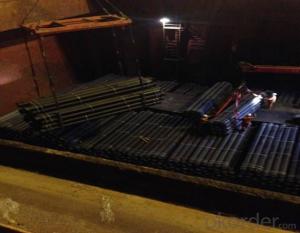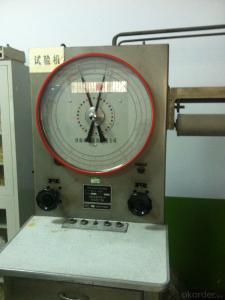DUCTILE IRON PIPE AND PIPE FITTINGS K8 CLASS DN200
- Loading Port:
- Tianjin
- Payment Terms:
- TT OR LC
- Min Order Qty:
- 23 pc
- Supply Capability:
- 3000 pc/month
OKorder Service Pledge
OKorder Financial Service
You Might Also Like
Material : Ductile Cast Iron
Size Range : DN 80mm to DN 2000mm
Unit Effective Length : 6m or 5.7m
Manufacture Standard: ISO 2531:1998/ EN 545:2006/EN 598:2007
Annual capacity : 200,000 tons
Coating Exterior: Zinc 130g/m2 according to ISO 8179-1 and bitumen coating 70 microns.
Cement Interior: Portland Cement/ High Alumina Cement/ Sulphate Resisting Cement Lining according to ISO 4179
Special requirements on external coating and internal lining can be applied
We also provide accessories such as SBR/EPDM rubber gaskets, lubricant paste, pipe caps, PE sleeves, etc.
Additional Parts:
Each pipe is strictly inspected according to related standard to ensure permanently high performance.
Easy Installation at site and service free for life
Long Service Lifespan
Quotation will arrive you within 24hours once we get your inquiry.
We guarantee offering you a competitive price.
A copy of original inspection reports of pipes will be offered after shipment.
Photos of loading process will be sent to the customer after shipment effect.
We will follow-up the delivery progress after shipment effect and update to the customer on weekly basis.
- Q:Are ductile iron pipes suitable for desalination plants?
- Yes, ductile iron pipes are suitable for desalination plants. They possess excellent corrosion resistance and durability, making them ideal for transporting seawater and brine solutions commonly found in desalination processes. Additionally, ductile iron pipes have high tensile strength, allowing them to withstand the high pressure and fluctuating temperatures associated with desalination operations.
- Q:How can the cast iron pipe of the ductile iron pipe be repaired?
- First of all, to see whether the manufacturers do elbow pressure did not reach, if it is. That can only be replaced, if not, with a cast iron electrode welding repair.By the way, ductile iron can only be welded and not welded.
- Q:Can ductile iron pipe be repaired if it gets damaged?
- Yes, ductile iron pipe can be repaired if it gets damaged. Various repair methods such as welding, clamping, and epoxy lining can be used to fix cracks, leaks, or other types of damage in ductile iron pipes. However, the repair method depends on the nature and extent of the damage, and it is recommended to consult with experts or professionals for proper repair procedures.
- Q:Can ductile iron pipes be used for fire protection systems?
- Yes, ductile iron pipes can be used for fire protection systems. Ductile iron is a type of cast iron that exhibits high strength and flexibility, making it suitable for a wide range of applications, including fire protection systems. It has excellent mechanical properties, including high tensile strength and impact resistance, which are important factors for withstanding the high pressures and stresses that can occur during fire suppression efforts. Ductile iron pipes are known for their durability and longevity, which is crucial for fire protection systems that need to be reliable and functional for extended periods of time. They have a longer lifespan compared to other materials, such as PVC or galvanized steel, and are less prone to corrosion, which is especially important for fire protection systems as they need to remain operational even after long periods of inactivity. Furthermore, ductile iron pipes have excellent fire resistance properties. They can withstand high temperatures without losing their structural integrity, ensuring that the fire protection system remains intact and functional during a fire emergency. This is crucial for ensuring the safety of occupants and minimizing property damage. In addition to their mechanical and fire-resistant properties, ductile iron pipes are also compatible with various types of fittings, valves, and accessories commonly used in fire protection systems. This allows for easy installation and integration into existing fire suppression networks. Overall, ductile iron pipes are a reliable and suitable choice for fire protection systems due to their high strength, durability, fire resistance, and compatibility with other system components.
- Q:Are ductile iron pipes suitable for installation in areas with high soil compaction and traffic loads?
- Yes, ductile iron pipes are suitable for installation in areas with high soil compaction and traffic loads. Ductile iron pipes have high strength and durability, making them capable of withstanding heavy loads and compression from soil compaction. They offer excellent resistance to external forces and have a long lifespan, making them a reliable choice for such conditions.
- Q:Are ductile iron pipes suitable for use in agricultural applications?
- Indeed, agricultural applications can benefit from the utilization of ductile iron pipes. Renowned for their remarkable strength and durability, these pipes are well-suited to endure the substantial loads and pressures frequently encountered in agricultural operations. Furthermore, their exceptional resistance to corrosion proves invaluable in agricultural settings where pipes may come into contact with chemicals or fertilizers. Additionally, the long lifespan of ductile iron pipes diminishes the necessity for frequent replacements, thereby minimizing maintenance expenses. In summary, the dependable choice of ductile iron pipes stems from their resilient nature and capacity to meet diverse agricultural demands.
- Q:Can ductile iron pipes be installed outdoors?
- Ductile iron pipes can be installed outdoors.
- Q:What is the manufacturing process of ductile iron pipes? Thank you
- Made of nodular cast iron: a strict chemical composition, the content of silicon in molten iron requirements than the original carbon gray cast iron, nodular cast iron in reduced manganese, phosphorus, sulfur content of two liquid iron tapping temperature cast iron is higher than the ash, than the compensation sphere, conceived at the disposal of liquid iron temperature. Off line ball three disposal, that is to add a liquid iron ball agent four inoculation disposal of five nodular cast iron activity is poor, thus shorten the larger, higher demand for pouring temperature and pouring system larger size, more use of the riser cold iron by one condensation heat treatment criterion six iron is iron carbon alloy carbon content greater than 2%, the carbon content in ordinary industrial pig iron containing C, SI and 2.5%--4%, and Mn, S, P and other elements, is a product of iron ores in blast furnace. According to the difference in the shape of the carbon in the pig iron, it can be divided into several kinds, such as steelmaking pig iron, forging pig iron and nodular cast iron.
- Q:What are the different sizes available for ductile iron pipe?
- Ductile iron pipes come in a wide variety of sizes to meet the needs of different applications in the water and wastewater industry. These pipes typically range in diameter from 3 inches to 64 inches. The most commonly used sizes are 4 inches, 6 inches, 8 inches, 10 inches, 12 inches, 16 inches, 20 inches, 24 inches, 30 inches, and 36 inches. However, larger sizes can also be manufactured for specific project requirements. Having different sizes available allows for flexibility in designing and constructing water distribution systems, sewage networks, and other infrastructure projects. The choice of the appropriate size depends on factors like the volume of flow, pressure requirements, and the distance the pipe needs to cover. It's important to note that the size of a ductile iron pipe refers to its internal diameter, which is also known as the nominal bore. The actual outside diameter of the pipe may vary slightly depending on the manufacturer and the specific dimensions provided. When selecting a size for ductile iron pipes, it's crucial to consider factors such as hydraulic capacity, installation requirements, and compatibility with other pipeline components. Seeking advice from engineers and industry experts is recommended to ensure the correct size is chosen for each particular application.
- Q:What are the different types of joints used in ductile iron pipes?
- Ductile iron pipes commonly utilize various types of joints to achieve secure and leak-proof connections between pipe sections. Here are some of the frequently employed joint types: 1. Push-on joint: This joint type offers easy installation without the need for specialized tools. It entails lubricating the gasket on one pipe end and inserting it into the socket of the adjacent pipe. The gasket ensures a tight seal to prevent any leakage. 2. Mechanical joint: Consisting of a gland and a follower gasket, this joint type involves placing the gland over the spigot end of one pipe and inserting the follower gasket into the bell end of the neighboring pipe. Bolts and nuts are then used to tighten the gland, compressing the gasket and creating a secure joint. 3. Restrained joint: In applications requiring restraint against axial movement or pressure thrust, this joint type is utilized. Typically, it involves a mechanical joint combined with additional components like tie rods, thrust blocks, or restrained couplings to provide the necessary restraint. 4. Flanged joint: Large diameter ductile iron pipes often employ flanged joints. They consist of a flange on one pipe end and a mating flange on the other pipe end. The two flanges are bolted together, establishing a robust and secure connection. Flanged joints enable easy disassembly and reassembly when necessary. 5. Welded joint: Welded joints are created by fusing the ends of two pipes together using heat and pressure. This type of joint ensures a permanent and strong connection. Welded joints are commonly employed in underground or buried applications where long-term durability is a crucial factor. It is essential to consider factors such as pipe diameter, application, and project requirements when selecting the appropriate joint type. Consulting with a professional engineer or referring to the manufacturer's guidelines is recommended to ensure the suitable joint type is chosen for ductile iron pipes.
1. Manufacturer Overview |
|
|---|---|
| Location | |
| Year Established | |
| Annual Output Value | |
| Main Markets | |
| Company Certifications | |
2. Manufacturer Certificates |
|
|---|---|
| a) Certification Name | |
| Range | |
| Reference | |
| Validity Period | |
3. Manufacturer Capability |
|
|---|---|
| a)Trade Capacity | |
| Nearest Port | |
| Export Percentage | |
| No.of Employees in Trade Department | |
| Language Spoken: | |
| b)Factory Information | |
| Factory Size: | |
| No. of Production Lines | |
| Contract Manufacturing | |
| Product Price Range | |
Send your message to us
DUCTILE IRON PIPE AND PIPE FITTINGS K8 CLASS DN200
- Loading Port:
- Tianjin
- Payment Terms:
- TT OR LC
- Min Order Qty:
- 23 pc
- Supply Capability:
- 3000 pc/month
OKorder Service Pledge
OKorder Financial Service
Similar products
New products
Hot products
Related keywords



























